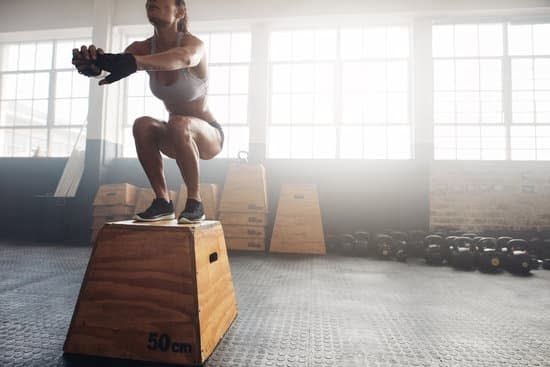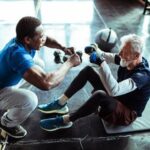In today’s fast-paced and modern society, physical fitness has become more important than ever. The sedentary lifestyle most people lead, coupled with the rise of technology, has resulted in an epidemic of unhealthy habits and a decline in overall well-being. However, research shows that there is much more to gain from maintaining physical fitness besides a healthy body. In fact, being physically fit can have numerous social benefits that can greatly enhance one’s quality of life.
When we think about the benefits of being physically fit, our minds often jump to improved physical health and increased energy levels. While these are certainly important elements, we must not overlook the profound impact it can have on our social interactions. People who prioritize their physical fitness not only experience an array of positive physiological changes but also find themselves reaping the rewards socially.
One major benefit that stems from being physically fit is increased self-confidence. Regular exercise and maintaining a healthy lifestyle contribute to an enhanced self-image and boost self-esteem. When individuals feel good about themselves and their bodies, they exude confidence in their daily interactions with others. This newfound self-assurance translates into better conversations, stronger connections, and an overall more positive outlook on life.
Moreover, physical fitness can lead to improved social skills as well. Engaging in regular exercise exposes individuals to various social settings such as gyms or outdoor activities where they can interact with like-minded people who share similar goals and interests.
Through these shared experiences, individuals develop communication skills and learn how to navigate different personalities effectively. Additionally, team sports and group fitness activities provide opportunities for teamwork and cooperation, fostering strong interpersonal skills that extend beyond the realms of physical activity.
In this increasingly interconnected world, making meaningful social connections is essential for personal growth and overall well-being. However, finding common ground with others can sometimes be challenging.
Fortunately, one way to overcome this hurdle is through joining fitness communities such as clubs or groups focused on specific workouts or sports. These communities provide a supportive and encouraging environment where individuals can connect with others who share their passion for physical fitness, making it easier to form genuine friendships and engage in activities together.
As we delve deeper into the social benefits of physical fitness, it becomes evident that taking care of our bodies goes beyond just personal health. It opens doors to new opportunities, helps build valuable relationships, and fosters personal growth.
With this in mind, it is crucial to recognize the value of physical fitness in today’s society and prioritize it as a means not only for improved health but also for enhanced social well-being. Whether through increased self-confidence, improved social skills, or joining various fitness communities, the rewards of being physically fit can contribute to a more fulfilling and socially enriched life.
Increased Self-Confidence
Physical fitness plays a significant role in enhancing self-image and boosting self-esteem. When individuals are physically fit, they tend to have a more positive perception of themselves, which ultimately translates into increased self-confidence. Engaging in regular exercise and maintaining a healthy lifestyle can contribute to an improved sense of self-worth and overall well-being.
One way that being physically fit enhances self-image is through the achievement of personal goals. Setting fitness goals, such as completing a marathon or reaching a certain weight, can provide individuals with a sense of accomplishment and pride in their abilities. As they work towards these goals, they witness firsthand the progress they make, which can greatly influence how they perceive themselves and their capabilities.
In addition to achieving physical milestones, being physically fit also improves body image. Regular exercise helps individuals maintain a healthy weight, tone muscles, and improve overall physical appearance. This can lead to greater satisfaction with one’s body and an increased level of confidence in one’s own skin. Furthermore, physical fitness often results in improved posture and body language, which can enhance overall presence and confidence in social interactions.
| Benefits | Data |
|---|---|
| Increase in self-confidence | Individuals who are physically fit tend to have higher levels of self-confidence compared to those who are not. |
| Achievement of personal goals | Setting and achieving fitness goals provides individuals with a sense of accomplishment. |
| Improved body image | Regular exercise improves physical appearance and leads to greater satisfaction with one’s body. |
Improved Social Interactions
Regular physical fitness not only offers numerous health benefits but also has a significant impact on one’s social interactions. Engaging in physical activities and maintaining a fit lifestyle can lead to more meaningful social connections, enriching the overall quality of life. In this section, we will delve into the various ways in which physical fitness improves social interactions.
Firstly, being physically fit often enhances self-confidence, which plays a crucial role in forming and nurturing relationships. When individuals feel good about themselves and their bodies, they are more likely to have a positive self-image and higher self-esteem. This increased self-confidence radiates outward and makes them more approachable, leading to better social interactions. Moreover, feeling confident physically helps individuals feel empowered mentally, allowing them to engage more assertively in social settings.
Additionally, physical fitness provides opportunities for individuals to connect with others who share similar interests or goals. Joining group exercise classes, sports teams, or fitness clubs allows people to meet like-minded individuals and forge new friendships based on common passions.
The sense of camaraderie that comes from engaging in physical activities together fosters strong bonds and creates a supportive network of friends who motivate each other towards their fitness goals. These shared experiences not only enhance the social aspect but also create lasting memories that strengthen connections.
Furthermore, physical fitness can improve communication and interpersonal skills, leading to more enjoyable and fulfilling social interactions. Regular exercise boosts cognitive function by increasing blood flow to the brain and releasing endorphins that elevate mood and reduce stress levels. As a result, physically fit individuals often demonstrate improved mental clarity and increased focus during conversations with others.
They are better able to convey their thoughts effectively while actively listening to others’ perspectives. These enhanced social skills contribute to stronger connections as they facilitate effective communication and understanding between individuals.
Increased Attractiveness
Physical fitness not only improves overall health and well-being, but it also has a significant impact on a person’s appearance. Engaging in regular physical activity and maintaining a healthy lifestyle can contribute to an individual’s attractiveness in various ways.
Firstly, physical fitness helps in achieving and maintaining a healthy weight. Regular exercise burns calories, builds muscle, and increases metabolism, which can help individuals shed excess body fat and develop a leaner physique. This can result in a more toned and sculpted appearance, enhancing one’s overall attractiveness.
Additionally, physical fitness contributes to improved skin health. Exercise promotes healthy blood flow and oxygenation of the skin, which can lead to a radiant complexion. It also helps to reduce inflammation and remove toxins from the body through sweating, resulting in clearer and healthier-looking skin.
Furthermore, regular physical activity has been linked to improved posture. Strong core muscles support the spine and help maintain proper alignment of the body. Good posture not only exudes confidence but also enhances one’s physical appearance by creating an elongated silhouette and emphasizing natural curves.
Enhanced Social Skills
Being physically fit not only has numerous health benefits but also has a positive impact on an individual‘s social skills. Physical fitness can enhance communication and interpersonal skills, leading to more effective interactions with others. These improved social skills can contribute to stronger relationships, increased confidence, and better overall well-being.
One of the ways physical fitness improves communication is by boosting self-confidence. When individuals are physically fit, they often feel more comfortable in their own skin, which translates into greater self-assurance when interacting with others. This increased self-confidence allows individuals to express themselves more clearly and assertively, making them more effective communicators.
Furthermore, physical fitness can improve interpersonal skills by fostering teamwork and cooperation. Many fitness activities require individuals to work together towards a common goal, such as in team sports or group classes. These experiences promote collaboration, communication, and trust among participants, resulting in enhanced interpersonal relationships both on and off the field.
Additionally, regular physical activity has been found to reduce stress and anxiety levels, which can help individuals communicate more effectively in social situations. Exercise releases endorphins that elevate mood and promote mental well-being.
When individuals engage in physical fitness activities regularly, they experience reduced levels of stress hormones like cortisol while also improving their ability to manage daily challenges. Consequently, this creates a calmer state of mind and makes it easier for people to connect with others on a deeper level.
Joining Fitness Communities
One of the key benefits of joining fitness communities is the sense of belonging and camaraderie that it fosters. By becoming a part of a fitness group or club, individuals are able to surround themselves with people who are also committed to leading a healthy and active lifestyle.
This shared passion creates a strong bond among members and provides a sense of community. Whether it’s through group workouts, training sessions, or social events organized by the community, individuals have ample opportunities to form meaningful connections with others who have similar goals and aspirations.
Additionally, joining fitness communities allows individuals to expand their social networks. These communities often consist of people from diverse backgrounds and age groups, which provides an opportunity for individuals to meet new friends outside their usual social circles. The supportive atmosphere within fitness groups and clubs encourages interaction and communication between members. Through this interaction, individuals can develop their communication and interpersonal skills while building new friendships.
Fitness and Team Sports
Participating in team sports and group fitness activities not only offers physical benefits but also provides numerous social advantages. Engaging in these types of activities promotes teamwork, camaraderie, and friendship building among participants. This section will explore the various social benefits one can gain from being involved in team sports and group fitness activities.
Firstly, participating in team sports fosters a sense of belonging and community. Being part of a team allows individuals to work together towards a common goal, developing strong bonds with their teammates along the way. Teammates often rely on and support each other, leading to an increased sense of trust and camaraderie. Through shared victories and setbacks, participants learn valuable life skills such as cooperation, communication, and perseverance.
Moreover, team sports provide individuals with opportunities for personal growth and self-improvement. Being part of a team encourages individuals to push their boundaries, challenge themselves, and strive for continuous improvement. This not only enhances their physical abilities but also boosts their self-confidence and self-esteem. As individuals become more physically fit through regular training and participation in team sports, they develop a positive body image and feel more confident in their own skin.
Furthermore, participating in group fitness activities allows individuals to expand their social circle and meet like-minded individuals who share similar interests. Whether it’s joining a cycling club or attending group workout classes at the gym, these activities provide opportunities for social interaction with fellow fitness enthusiasts. Working out together creates a supportive environment where individuals can motivate each other to achieve their fitness goals while building meaningful connections along the way.
Networking Opportunities
Networking in Fitness and Wellness Events
One of the surprising benefits of being physically fit is the networking opportunities it can create in various settings, particularly fitness and wellness events. Whether it’s a marathon, a yoga retreat, or a fitness conference, these gatherings bring together individuals with similar interests and goals. Participating in such events not only allows you to connect with like-minded individuals but also provides a platform for networking with professionals in the fitness industry.
Fitness and wellness events often attract trainers, instructors, nutritionists, and other experts who are passionate about improving people’s health and well-being. By actively engaging in conversations during these events, you may have the chance to interact with professionals who can offer valuable insights into fitness trends, training techniques, or even career opportunities. These networking connections can open doors to new possibilities and help you stay up-to-date with the latest developments in the fitness world.
Networking Through Online Fitness Communities
In today’s digital age, physical fitness has spilled over into online communities where individuals can connect and share their fitness journeys. Online platforms dedicated to health and wellness provide an excellent opportunity for networking with people from all walks of life who share a common interest in staying physically fit. Whether through social media groups or specialized fitness forums, these communities enable individuals to find support, motivation, and valuable advice.
Joining online fitness communities allows for interaction with people from diverse backgrounds who may have different perspectives on health and fitness. Engaging in discussions on topics such as workout routines, nutrition plans, or overcoming challenges can help you expand your knowledge and gain fresh insights into maintaining physical well-being. Additionally, these virtual networks often organize meet-ups or local events where members can come together face-to-face to further strengthen their connections.
Networking at Fitness Facilities
Fitness facilities such as gyms or studios are not only spaces for exercising but also serve as hubs for social interaction and networking. These environments provide an opportunity to connect with individuals who are also passionate about their physical well-being. Whether you strike up a conversation while waiting for a class to start or spot someone using a piece of equipment you’re interested in, fitness facilities offer organic opportunities to meet new people with similar fitness goals.
Building connections at fitness facilities can go beyond casual conversations. Instructors, personal trainers, or fellow gym-goers can provide guidance, support, and encouragement on your fitness journey. They may share their experiences, offer workout tips, or recommend resources that have helped them improve their physical fitness. The relationships formed in these settings can foster accountability and create a sense of belonging within the fitness community.
Networking opportunities resulting from physical fitness not only enhance one’s social circle but can also lead to personal growth and professional development. By actively engaging with others who share a passion for physical well-being, individuals can expand their network and gain valuable insights that contribute to overall success in both social and professional spheres.
Overcoming Social Barriers
Introduction to Overcoming Social Barriers
Physical fitness not only has numerous benefits for our physical health, but it also plays a crucial role in our social well-being. In a society where social interaction and connection are highly valued, individuals who struggle with social isolation and shyness may find solace in the realm of physical fitness. Engaging in regular exercise and maintaining physical fitness can help individuals overcome these barriers by boosting self-confidence, providing opportunities for social connection, and improving overall mental well-being.
Boosting Self-Confidence
One of the key ways that physical fitness can help individuals overcome social isolation and shyness is by boosting self-confidence. Regular exercise releases endorphins, which are known as “feel-good” hormones that can significantly improve mood and overall mental well-being.
As individuals start to see improvements in their physical strength, endurance, and appearance, their self-image begins to transform positively. This newfound confidence can empower individuals to step out of their comfort zones socially and engage more confidently with others.
Creating Social Opportunities
Engaging in physical fitness activities also opens up doors for individuals to meet like-minded people and create meaningful connections. Whether it’s through joining fitness groups or clubs at local gyms, participating in group exercise classes, or attending fitness events, the shared interest in physical activity provides a common ground for individuals to connect with others. These interactions can lead to a sense of belongingness, friendship, and support network that helps combat feelings of social isolation or shyness.
By overcoming initial fears or hesitations associated with engaging in social situations, individuals who prioritize their physical fitness journey may find themselves building stronger relationships with others while simultaneously improving their overall well-being. It is important to recognize that everyone’s journey towards overcoming social barriers is unique, but physical fitness can undoubtedly serve as a catalyst for positive change in this area.
Conclusion
In conclusion, physical fitness plays a crucial role in enhancing social well-being in today’s society. By prioritizing their fitness journey, individuals can experience numerous social benefits that contribute to a more fulfilling and enjoyable life.
One of the key advantages of being physically fit is the increased self-confidence it brings. Regular exercise and maintaining a healthy lifestyle have been proven to enhance self-image and boost self-esteem. When individuals feel good about themselves, they are more likely to engage confidently in social interactions, making meaningful connections with others.
Moreover, physical fitness has a positive impact on one’s appearance, thus increasing attractiveness. People who are physically fit often exude vitality and radiance, which naturally attracts others. This improved physical appearance can lead to greater social opportunities and enhance one’s overall social experiences.
Additionally, engaging in regular exercise and participating in sports or fitness activities can improve communication and interpersonal skills. Physical fitness challenges individuals to push their limits, fostering resilience and determination that can transfer into other areas of life. As a result, they become better equipped to interact with others effectively, leading to more positive social exchanges.
Furthermore, joining fitness communities and participating in team sports provide unique opportunities for social connections. These environments allow individuals to meet like-minded people who share similar interests and goals. The sense of camaraderie within these groups fosters long-lasting friendships while also providing support and motivation along the fitness journey.
Frequently Asked Questions
What Is the Social Benefit of a Physically Fit Person?
A physically fit person offers numerous social benefits to themselves and their community. Firstly, being physically fit often leads to improved mental well-being and overall mood, which can positively impact interpersonal relationships. Additionally, they tend to have higher levels of energy and stamina, making them more likely to engage in social activities such as team sports or outdoor adventures with friends and family.
This not only contributes to a healthier social life but also strengthens bonds and promotes connection with others. Furthermore, a physically fit person often serves as an inspiration and role model for those around them, encouraging others to prioritize their health and well-being.
Why Is It Important for Us to Be Physically and Socially Fit?
Being physically fit goes hand in hand with being socially fit because our physical health significantly impacts our ability to engage in social interactions and maintain relationships. When we are physically fit, we have higher levels of energy, endurance, and overall vitality which allows us to actively participate in various social activities without feeling tired or limited by our physical condition.
Moreover, physical fitness enhances our self-confidence and self-esteem, which positively affects how we present ourselves in social situations. Engaging in regular exercise also helps reduce stress, anxiety, and depression – all of which can have a detrimental effect on our social lives.
What Is Social in Physical Fitness?
The concept of “social” in physical fitness refers to the ways in which physical fitness intersects with our social interactions and relationships. It emphasizes the importance of engaging in activities that promote not only individual health but also community well-being. For example, participating in group exercises or team sports fosters a sense of camaraderie and teamwork among individuals who share common fitness goals.
Social elements are also present in gym classes or fitness clubs where individuals connect with like-minded peers who support each other’s journeys towards better health. Moreover, physical fitness promotes inclusivity by providing opportunities for people from diverse backgrounds to come together through shared interests in exercise and maintaining a healthy lifestyle, thus fostering social integration within communities.

Passionate about providing useful information to anyone with an interest in the field of Personal Training, I strive to pass on to our readers quality information and to answer any questions about Personal Trainers, the work they do and how to become one.





